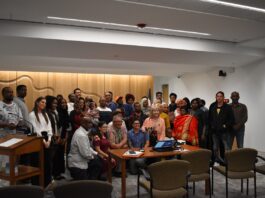Kelsey Dawes expects cutting-edge technology will soon be able to motivate changed behaviors by personalizing nutrition plans using quantifiable data, ultimately preventing deadly cases of disease. That’s the goal of her research as CEO and founder of Relevant Methylomics, a startup company she began as a PhD student at the University of Iowa where she […]
Already a subscriber? Log in
Want to Read More?
Get immediate, unlimited access to all subscriber content and much more.
Learn more in our subscriber FAQ.
- Unparalleled business coverage of the Iowa City / Cedar Rapids corridor.
- Immediate access to subscriber-only content on our website.
- 26 issues per year delivered digitally, in print or both.
- Support locally owned and operated journalism.
Do you want to read and share this article without a paywall?
Click here to purchase a paywall bypass linkKelsey Dawes expects cutting-edge technology will soon be able to motivate changed behaviors by personalizing nutrition plans using quantifiable data, ultimately preventing deadly cases of disease.
That’s the goal of her research as CEO and founder of Relevant Methylomics, a startup company she began as a PhD student at the University of Iowa where she is studying the applicable uses of epigenetic technology.
“You can think of your cells as the computer and your genetics as the hardware of the computer,” she explained. “Your epigenetics is kind of like the software that you update. You need both of them to have a computer. Genetics are the same in all your cells, but what genes are doing and how they are expressed is caused by epigenetics. Epigenetics is the bridge between your environment, lifestyle, behaviors and genetics.”
Her product, which could enter the market within 6-8 months if patents are approved, is a saliva-based at-home test that will diagnose the nutrition levels of cells to determine what each cell actually needs. Once results are received, individuals may then choose to follow specific nutrition plans or take custom vitamins, improving long-term health.
In the Corridor, Relevant Methylomics’ parent company Behavioral Diagnostics, where Ms. Dawes is the chief scientific officer, is working on three separate epigenetics products related to smoking intensity, alcohol intensity and lung cancer.
Another UI startup company, Cardio Diagnostics, is going public later this year after a $175 million merger with Mana Capital Acquisition Corporation in Delaware, pending U.S. Securities and Exchange Commission approval. They are best known for creating the first AI-integrated epigenetic engine to test the risk of coronary heart disease. Robert Philibert, a UI professor of psychiatry, works closely on all three companies and is a business partner to Ms. Dawes at Behavioral Diagnostics and Relevant Methylomics
The field is booming not just locally but worldwide. A global forecast on the epigenetics market projects the industry will surpass $3.9 billion by 2027, more than doubling the current market value of the field in 2022.
